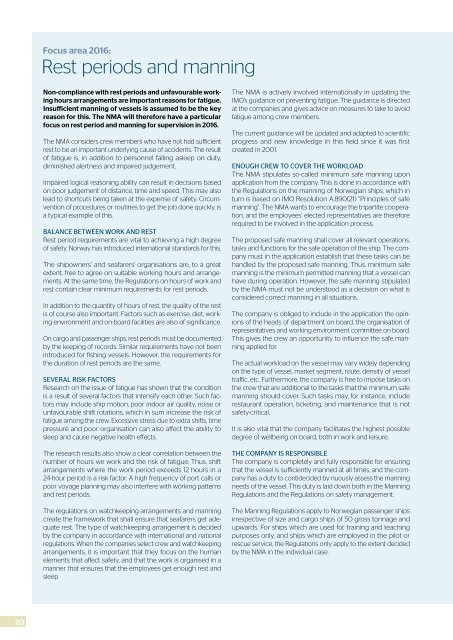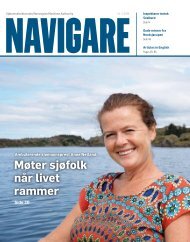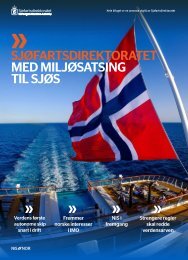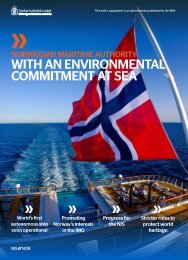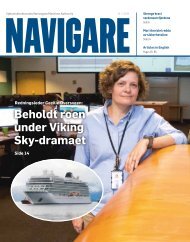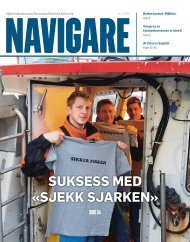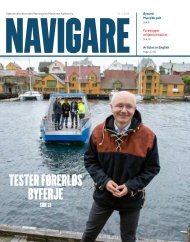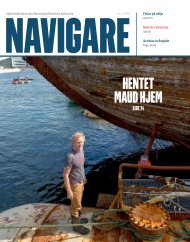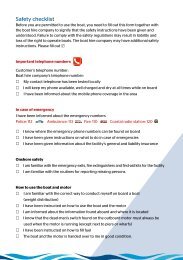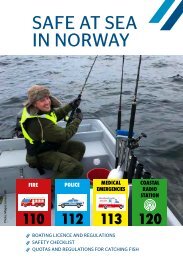Fokus på risiko 2016
Sjøfartsdirektoratets årlige risikorapport som redegjør for risikosituasjonen i skipssikkerhetssammenheng.
Sjøfartsdirektoratets årlige risikorapport som redegjør for risikosituasjonen i skipssikkerhetssammenheng.
- No tags were found...
Create successful ePaper yourself
Turn your PDF publications into a flip-book with our unique Google optimized e-Paper software.
Focus area <strong>2016</strong>:<br />
Rest periods and manning<br />
Non-compliance with rest periods and unfavourable working<br />
hours arrangements are important reasons for fatigue.<br />
Insufficient manning of vessels is assumed to be the key<br />
reason for this. The NMA will therefore have a particular<br />
focus on rest period and manning for supervision in <strong>2016</strong>.<br />
The NMA considers crew members who have not had sufficient<br />
rest to be an important underlying cause of accidents. The result<br />
of fatigue is, in addition to personnel falling asleep on duty,<br />
diminished alertness and impaired judgement.<br />
Impaired logical reasoning ability can result in decisions based<br />
on poor judgement of distance, time and speed. This may also<br />
lead to shortcuts being taken at the expense of safety. Circumvention<br />
of procedures or routines to get the job done quickly, is<br />
a typical example of this.<br />
BALANCE BETWEEN WORK AND REST<br />
Rest period requirements are vital to achieving a high degree<br />
of safety. Norway has introduced international standards for this.<br />
The shipowners’ and seafarers’ organisations are, to a great<br />
extent, free to agree on suitable working hours and arrangements.<br />
At the same time, the Regulations on hours of work and<br />
rest contain clear minimum requirements for rest periods.<br />
In addition to the quantity of hours of rest, the quality of the rest<br />
is of course also important. Factors such as exercise, diet, working<br />
environment and on-board facilities are also of significance.<br />
On cargo and passenger ships, rest periods must be documented<br />
by the keeping of records. Similar requirements have not been<br />
introduced for fishing vessels. However, the requirements for<br />
the duration of rest periods are the same.<br />
SEVERAL RISK FACTORS<br />
Research on the issue of fatigue has shown that the condition<br />
is a result of several factors that intensify each other. Such factors<br />
may include ship motion, poor indoor air quality, noise or<br />
unfavourable shift rotations, which in sum increase the risk of<br />
fatigue among the crew. Excessive stress due to extra shifts, time<br />
pressure and poor organisation can also affect the ability to<br />
sleep and cause negative health effects.<br />
The research results also show a clear correlation between the<br />
number of hours we work and the risk of fatigue. Thus, shift<br />
arrangements where the work period exceeds 12 hours in a<br />
24-hour period is a risk factor. A high frequency of port calls or<br />
poor voyage planning may also interfere with working patterns<br />
and rest periods.<br />
The regulations on watchkeeping arrangements and manning<br />
create the framework that shall ensure that seafarers get adequate<br />
rest. The type of watchkeeping arrangement is decided<br />
by the company in accordance with international and national<br />
regulations. When the companies select crew and watchkeeping<br />
arrangements, it is important that they focus on the human<br />
elements that affect safety, and that the work is organised in a<br />
manner that ensures that the employees get enough rest and<br />
sleep.<br />
The NMA is actively involved internationally in updating the<br />
IMO’s guidance on preventing fatigue. The guidance is directed<br />
at the companies and gives advice on measures to take to avoid<br />
fatigue among crew members.<br />
The current guidance will be updated and adapted to scientific<br />
progress and new knowledge in this field since it was first<br />
created in 2001.<br />
ENOUGH CREW TO COVER THE WORKLOAD<br />
The NMA stipulates so-called minimum safe manning upon<br />
application from the company. This is done in accordance with<br />
the Regulations on the manning of Norwegian ships, which in<br />
turn is based on IMO Resolution A.890(21) “Principles of safe<br />
manning”. The NMA wants to encourage the tripartite cooperation,<br />
and the employees’ elected representatives are therefore<br />
required to be involved in the application process.<br />
The proposed safe manning shall cover all relevant operations,<br />
tasks and functions for the safe operation of the ship. The company<br />
must in the application establish that these tasks can be<br />
handled by the proposed safe manning. Thus, minimum safe<br />
manning is the minimum permitted manning that a vessel can<br />
have during operation. However, the safe manning stipulated<br />
by the NMA must not be understood as a decision on what is<br />
considered correct manning in all situations.<br />
The company is obliged to include in the application the opinions<br />
of the heads of department on board, the organisation of<br />
representatives and working environment committee on board.<br />
This gives the crew an opportunity to influence the safe manning<br />
applied for.<br />
The actual workload on the vessel may vary widely depending<br />
on the type of vessel, market segment, route, density of vessel<br />
traffic, etc. Furthermore, the company is free to impose tasks on<br />
the crew that are additional to the tasks that the minimum safe<br />
manning should cover. Such tasks may, for instance, include<br />
restaurant operation, ticketing, and maintenance that is not<br />
safety critical.<br />
It is also vital that the company facilitates the highest possible<br />
degree of wellbeing on board, both in work and leisure.<br />
THE COMPANY IS RESPONSIBLE<br />
The company is completely and fully responsible for ensuring<br />
that the vessel is sufficiently manned at all times, and the company<br />
has a duty to contidecided by nuously assess the manning<br />
needs of the vessel. This duty is laid down both in the Manning<br />
Regulations and the Regulations on safety management.<br />
The Manning Regulations apply to Norwegian passenger ships<br />
irrespective of size and cargo ships of 50 gross tonnage and<br />
upwards. For ships which are used for training and teaching<br />
purposes only, and ships which are employed in the pilot or<br />
rescue service, the Regulations only apply to the extent decided<br />
by the NMA in the individual case.<br />
20


